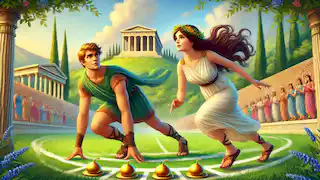The Race of Atalanta and Hippomenes
Introduction
In ancient Greece, a land rich with myths and legends, there existed a princess named Atalanta, known for her exceptional speed and beauty. Raised by hunters after being abandoned by her father, Atalanta grew up to be an adept huntress and athlete, blessed by the goddess Artemis. Her fame spread across Greece, not just for her physical prowess but also for her vow to remain a virgin, a promise she made to honor Artemis.
Atalanta was determined never to marry, setting an impossible condition for her suitors: they must beat her in a footrace. If they failed, they would pay with their lives. Despite the grim stakes, many men tried, driven by her beauty and the allure of glory, but none succeeded. Atalanta’s speed was unmatched, and her resolve unwavering.
One day, a young man named Hippomenes, captivated by tales of Atalanta’s beauty and prowess, decided to enter the race. Unlike the others, Hippomenes was not just enamored by her appearance; he admired her strength and spirit. Realizing that speed alone wouldn’t win the race, he sought the help of Aphrodite, the goddess of love, who gave him three golden apples from the Garden of the Hesperides. These enchanted apples, she explained, would distract Atalanta and give him a chance to win.
The day of the race arrived, with crowds gathered in eager anticipation. Atalanta, confident and graceful, stood at the starting line, while Hippomenes, holding the golden apples close, prepared himself for the challenge. The tension was palpable as the signal to start was given.
The Start of the Race
The race began with Atalanta surging ahead, her feet barely touching the ground as she flew over the track. Hippomenes followed, his heart pounding not just from the exertion but from the weight of the plan he carried. The spectators watched in awe as Atalanta's lead grew. She was a blur of motion, her long hair streaming behind her like a banner.
Hippomenes knew he had to act quickly. He reached into his tunic and threw the first golden apple. It landed ahead of Atalanta, glittering in the sunlight. Surprised, she slowed down, her curiosity piqued by the beautiful object. This brief hesitation allowed Hippomenes to close the gap between them. She quickly resumed her pace, however, and was once again pulling ahead.
The crowd murmured in surprise and intrigue. The golden apples were an unexpected twist. Some spectators, aware of the myths surrounding these magical fruits, speculated about their significance. Others simply marveled at their beauty, wondering if Hippomenes could truly outsmart the huntress.
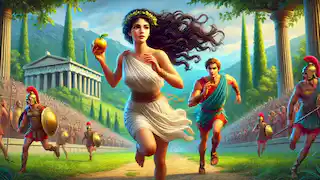
The Second Apple
As the race continued, Hippomenes threw the second apple, aiming further ahead. Atalanta, despite her determination to win, could not ignore the dazzling object. It was as if a spell had been cast on her; she was drawn to the apples. She slowed again, picking up the apple and examining it briefly before continuing the race.
This pause gave Hippomenes another advantage, allowing him to nearly catch up to her. Atalanta, now carrying two apples, felt a strange mixture of emotions. There was a thrill in the chase, a challenge that went beyond mere physical prowess. She wondered about this suitor who, unlike others, seemed to have a strategy. His confidence and the mysterious apples added an unpredictable element to the race.
The crowd was on edge, every eye following the two racers closely. The atmosphere was electric, filled with the collective breath-holding of the spectators. They could see that Hippomenes had more than speed; he had a plan, and it was working. The golden apples were causing Atalanta to hesitate, something no other suitor had managed.
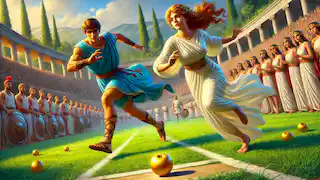
The Final Apple
As they neared the finish line, the tension reached its peak. Hippomenes, seeing the end in sight, threw the third and final apple even farther than the previous ones. This apple was the most beautiful of all, its golden sheen catching the light in a way that made it appear almost magical. Atalanta, once again unable to resist, veered off the track to retrieve it.
This final distraction was decisive. Hippomenes sprinted towards the finish line, his heart pounding with the realization that victory was within his grasp. Atalanta, with the last apple in hand, realized too late that she had been outmaneuvered. She ran with all her might, but Hippomenes crossed the finish line first.
The crowd erupted in cheers and gasps of disbelief. Atalanta, the undefeated champion, had finally been bested. But instead of bitterness, she felt a deep respect for Hippomenes. He had not won through brute strength or sheer speed, but through cleverness and strategy. There was a nobility in his victory, a quality that Atalanta could not ignore.
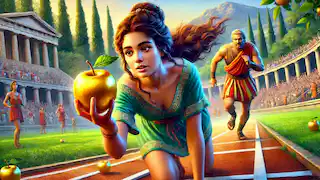
The Aftermath
As the crowd celebrated, Atalanta approached Hippomenes. She congratulated him, acknowledging his victory with grace. Hippomenes, respectful and humble, thanked her for the race and expressed his admiration for her skills and spirit. The two stood before the cheering crowd, both feeling a mix of emotions—relief, respect, and a burgeoning affection.
The king, Atalanta’s father, declared the marriage of the two as per the agreed condition. However, Hippomenes and Atalanta's union was not merely a matter of obligation; they had come to respect and admire each other deeply. They were married with great ceremony, and their story quickly became a legend, told and retold across Greece.
Yet, as with many tales involving the gods, their happiness was marred by divine intervention. In their joy and newfound love, Hippomenes and Atalanta neglected to thank Aphrodite for her help. The goddess of love, feeling slighted, decided to punish them. She sent a fierce passion upon them, and they desecrated a sacred space of Zeus by making love in his temple.
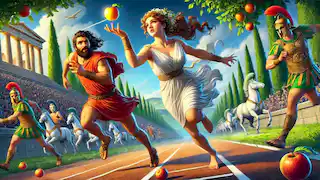
Transformation and Legacy
Zeus, angered by this disrespect, transformed them into lions. According to the beliefs of the time, lions were unable to mate with each other, thus ensuring that their love could never be fulfilled. This transformation was both a punishment and a form of eternal preservation, as they were immortalized in their majestic, powerful forms.
The story of Atalanta and Hippomenes serves as a cautionary tale in Greek mythology. It highlights the dangers of pride, the necessity of honoring the gods, and the unpredictability of fate. Despite their tragic end, they are remembered for the unique qualities they brought to their race: Atalanta's unparalleled speed and strength, and Hippomenes' cleverness and determination.
Their story became a symbol of the complex interplay between human desires and divine will, a reminder that even the most seemingly perfect plans can go awry when the gods are involved. It also spoke to the importance of respecting divine powers, a common theme in Greek mythology where mortals often paid dearly for their hubris.
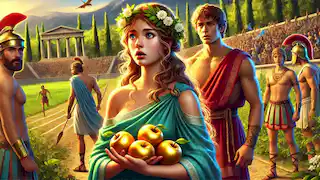
Epilogue
The tale of Atalanta and Hippomenes continues to be a powerful narrative within Greek mythology. It is a story that resonates with themes of love, competition, and the consequences of divine intervention. As lions, they were a symbol of strength and pride, yet their inability to be together served as a perpetual reminder of the price of offending the gods.
Even as they roamed the forests, they were forever connected by their shared past and the love that had blossomed between them, however briefly. Their legend lived on, not just as a tale of a race but as a broader reflection on the nature of love, honor, and respect for the divine. It teaches that while humans may have their strengths, the will of the gods is an ever-present force that must be acknowledged and respected.
Thus ends the story of Atalanta and Hippomenes, a tale rich with the moral and mystical elements that make Greek mythology so enduring and captivating. It is a story that has been passed down through generations, a timeless reminder of the power of wit and the inevitability of fate.
